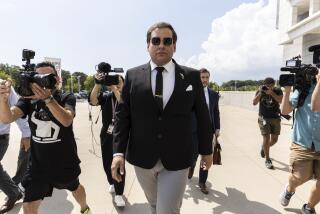Brazilians Fascinated by TV’s Making of President : South America: In the era of electronic politics, a game show host joins the race and takes an immediate lead.
- Share via
RIO DE JANEIRO — Brazilians are fascinated by a spectacle never before seen in Latin America’s biggest country: the making of a president in the electronic age.
Unlike the last time Brazilians elected a president, in 1960, televised political propaganda and computerized survey results are key elements of the current campaign for the Nov. 15 voting.
And in a dazzling development this week that underlined the new role of TV and lightning polls, a popular television entertainer stole the political show by announcing his candidacy and seizing the lead in the latest opinion survey.
Silvio Santos, 58, owner of Brazil’s second-largest television network and the star of a game and variety show that sweeps audience ratings on Sunday afternoons, entered the presidential race Tuesday night. A Gallup Poll taken Wednesday and published Thursday showed him ahead of all other candidates with a 29% preference rating.
Fernando Collor de Mello, previously the front-runner in polls, sank from 28% to 19% of the preferences, according to Gallup.
Santos’ big advantage is television charisma, especially among Brazil’s poor majority, which is the target audience of his Sunday show. The program runs for several hours, with a generous flow of contest prizes and happy chatter by the ever-smiling host, who is a former street vendor and self-made millionaire.
Other candidates have access to free television, but nothing to match the TV exposure Santos has enjoyed for more than a decade.
Privately owned networks, including Santos’, give up 70-minute “free hours,” every day at 1 p.m. and 8:25 p.m. for presidential campaign propaganda. Prime-time soap operas have been rescheduled since the free hours began Sept. 15, and there are no business commercials between political spots, although networks get some tax breaks in compensation.
Time for each of 22 candidates was allotted according to the number of congressional seats held by his supporters, varying from 30 seconds to 22 minutes a day.
Political parties are playing minor roles in the campaign. And money is less important than in a U.S. presidential race because national television time costs the candidates nothing.
“It’s not necessarily who’s got the most money who gets the most attention,” said Ian McCluskey, editor of Brazil Watch, a political and economic analysis service.
The television spots generally emphasize the personal traits and popular appeal of the candidates, many with state-of-the-art advertising techniques such as computer-designed graphics.
Weekly opinion surveys, ranking the leading candidates by voter preference within hours after polls are taken, lend to the campaign the immediacy of a horse race in progress.
“The polls are important,” McCluskey said. “That’s new to Brazil. It’s kind of exciting.”
Brazilian television and opinion surveys were undeveloped in 1960 when Janio Quadros won the last direct presidential election. Only one in every 20 Brazilian homes had a TV set then, and candidates received no free broadcast time.
Congressional, state and municipal elections have been held since the armed forces seized power in 1964, but no office has been filled by a nationwide ballot. Jose Sarney, the interim civilian president, took office in 1985 as the result of an electoral college vote.
Today, the great majority of Brazil’s 145 million people have television, which reaches every corner of the sprawling country. After a month and a half, it is clear that the candidates with the most time on the tube do not necessarily do the best in opinion polls. Former congressional chairman Ulysses Guimaraes and former Vice President Aureliano Chaves have the most minutes, but they are favored by a combined total of less than 6% of the voters, according to the latest opinion surveys.
Brazilian analysts agree that the most polished TV personality in the campaign before Santos entered was Guilherme Afif Domingo, a 46-year-old businessman with a warm smile and strong stage presence. One commentator called Afif “an actor in search of an author,” because apparently his lines have not proved convincing to most Brazilians: In the latest poll this week Afif had dropped to seventh place with 4% of voter preferences.
Another accomplished TV performer is Collor, 40, a handsome former governor who delights rally crowds with flailing arms and hoarsely shouted vows to fight official corruption and cut the salaries of overpaid bureaucrats. But Collor’s poll ratings had dropped from more than 40% to less than 30% even before Santos bumped him to second place.
Before Santos, the latest rising star in the polls was leftist Luis Inacio da Silva, known as Lula, who had been dueling with populist Leonel Brizola for second place at around 15% in recent polls. Both Lula and Brizola dropped to around 10% in the new Gallup Poll that included Santos.
More to Read
Sign up for Essential California
The most important California stories and recommendations in your inbox every morning.
You may occasionally receive promotional content from the Los Angeles Times.













